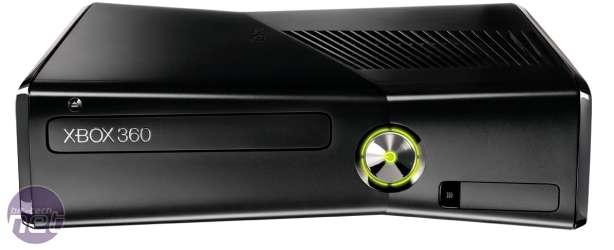Is The Xbox 720 Going To Kill Off Second Hand Gaming?
March 9, 2012 | 11:08
Companies: #bit-tech #blu-ray #microsoft

The Next-box
Microsoft’s plan for its next Xbox could potentially be the knockout blow for the second hand market, one that would have deep ramifications. It should be said that the firm hasn’t confirmed anything yet, but a report at MCV suggests this is firmly what it's planning. It also falls into line with rumours that have been circling for some time.
A games console without an optical drive is, inevitably, going to rely heavily on selling downloadable games. You can’t imagine that that’d be the only way to get hold of software, not least because the world’s Internet bandwidth is far from able to cope with the idea of gigabytes of Modern Warfare sequels being download on launch day.
MCV reports that the machine will have “compatibility with some sort of interchangeable solid-state card storage”, although what that turns out to be remains to be seen. It’ll presumably be enough to give the new Xbox presence at retail, but don’t rule out whatever form of storage it utilises having some strong, second hand-fighting DRM built in. That's speculation on our part, though.
However, if the bookies would take the bet, we’d wager right now that the new Xbox will have the biggest hard drive that Microsoft can afford to put in it. Back when the Xbox 360 launched, it’s almost laughable now to think that 20GB seemed a lot storage (and then there's the subsequently-launched Arcade SKU, with none). Just two or three modern blockbusters could comfortably fill that now, and thus for Microsoft’s presumed download strategy to work, it needs to be looking closer to a terabyte, just to make sure we’ve got somewhere to keep all the games we’re presumably going to buy.

Danger
But Microsoft might just be playing a dangerous game, here. Gaming has been dependent on retail for several reasons, and outright visibility is one of them. The cost of getting your display material in the window of GAME in the run up to Christmas was never particularly cheap, but it was money generally well spent. The sheer exposure that a big push in a store could offer, even to customers just blithely walking by the window, is one of the oft-unheralded advantages of retail. The midnight launch, and the noise that goes into promoting that, another.
There’s not a gaming retail chain now that’s not dependant on the second hand market for decent margins, though. The big supermarkets have regularly been known to sell big releases for a lower price than independent retailers are able to buy them for at what’s supposed to be trade cost. Stories of gaming store staff heading to Tesco to buy stock are no exaggeration.
But then supermarkets are interested in the big hits, and not the broader catalogue. Thus, they erode the margins on the titles that gaming stores used to be able to depend on, and have left the specialist sector scrabbling around for fresh ways to stay in business. Second hand games has proven, comfortably, the most viable. The whole Gamestation chain grew off the back of it.
If that part of the specialist sector’s business is cut off, though, where does that leave gaming retail? Without a specialist element to it might just be the likely answer. It’s no secret that GAME, Gamestation and HMV are in financial trouble, and will do well to see out the year in their current shape. They are, you can’t help but fear, the proverbial tip of the iceberg.

Games publishers and developers may well delight in the short term boost they get from a new generation of disc-less games consoles (although we’d wager that Sony will stick with the Blu-ray format in its next PlayStation). But while it might make the balance sheet look better on bigger releases, there’s a real risk that this will be a hammer blow to independent retail, that will have ramifications further down the line. And when the time comes to try and push a smaller, interesting title? There may not be the specialist staff to do it.
That’s not likely to hit the balance sheet of Microsoft and its ilk particularly hard. But the next Xbox might just, if all concerned aren’t careful, usher in a new kind of gaming retail, burning the bridge back as it does so. This may all be an over-reaction: the removable storage that Microsoft opts for may well service the retail sector perfectly well, and keep second hand bubbling.
If it doesn't, though, as many fear, there may be difficulties, both seen and unforeseen, ahead...
Microsoft’s plan for its next Xbox could potentially be the knockout blow for the second hand market, one that would have deep ramifications. It should be said that the firm hasn’t confirmed anything yet, but a report at MCV suggests this is firmly what it's planning. It also falls into line with rumours that have been circling for some time.
A games console without an optical drive is, inevitably, going to rely heavily on selling downloadable games. You can’t imagine that that’d be the only way to get hold of software, not least because the world’s Internet bandwidth is far from able to cope with the idea of gigabytes of Modern Warfare sequels being download on launch day.
MCV reports that the machine will have “compatibility with some sort of interchangeable solid-state card storage”, although what that turns out to be remains to be seen. It’ll presumably be enough to give the new Xbox presence at retail, but don’t rule out whatever form of storage it utilises having some strong, second hand-fighting DRM built in. That's speculation on our part, though.
However, if the bookies would take the bet, we’d wager right now that the new Xbox will have the biggest hard drive that Microsoft can afford to put in it. Back when the Xbox 360 launched, it’s almost laughable now to think that 20GB seemed a lot storage (and then there's the subsequently-launched Arcade SKU, with none). Just two or three modern blockbusters could comfortably fill that now, and thus for Microsoft’s presumed download strategy to work, it needs to be looking closer to a terabyte, just to make sure we’ve got somewhere to keep all the games we’re presumably going to buy.

They will need hard drives. Big hard drives. Lots of hard drives.
Danger
But Microsoft might just be playing a dangerous game, here. Gaming has been dependent on retail for several reasons, and outright visibility is one of them. The cost of getting your display material in the window of GAME in the run up to Christmas was never particularly cheap, but it was money generally well spent. The sheer exposure that a big push in a store could offer, even to customers just blithely walking by the window, is one of the oft-unheralded advantages of retail. The midnight launch, and the noise that goes into promoting that, another.
There’s not a gaming retail chain now that’s not dependant on the second hand market for decent margins, though. The big supermarkets have regularly been known to sell big releases for a lower price than independent retailers are able to buy them for at what’s supposed to be trade cost. Stories of gaming store staff heading to Tesco to buy stock are no exaggeration.
But then supermarkets are interested in the big hits, and not the broader catalogue. Thus, they erode the margins on the titles that gaming stores used to be able to depend on, and have left the specialist sector scrabbling around for fresh ways to stay in business. Second hand games has proven, comfortably, the most viable. The whole Gamestation chain grew off the back of it.
If that part of the specialist sector’s business is cut off, though, where does that leave gaming retail? Without a specialist element to it might just be the likely answer. It’s no secret that GAME, Gamestation and HMV are in financial trouble, and will do well to see out the year in their current shape. They are, you can’t help but fear, the proverbial tip of the iceberg.

Retail has served the Xbox 360 well
Games publishers and developers may well delight in the short term boost they get from a new generation of disc-less games consoles (although we’d wager that Sony will stick with the Blu-ray format in its next PlayStation). But while it might make the balance sheet look better on bigger releases, there’s a real risk that this will be a hammer blow to independent retail, that will have ramifications further down the line. And when the time comes to try and push a smaller, interesting title? There may not be the specialist staff to do it.
That’s not likely to hit the balance sheet of Microsoft and its ilk particularly hard. But the next Xbox might just, if all concerned aren’t careful, usher in a new kind of gaming retail, burning the bridge back as it does so. This may all be an over-reaction: the removable storage that Microsoft opts for may well service the retail sector perfectly well, and keep second hand bubbling.
If it doesn't, though, as many fear, there may be difficulties, both seen and unforeseen, ahead...

MSI MPG Velox 100R Chassis Review
October 14 2021 | 15:04









Want to comment? Please log in.